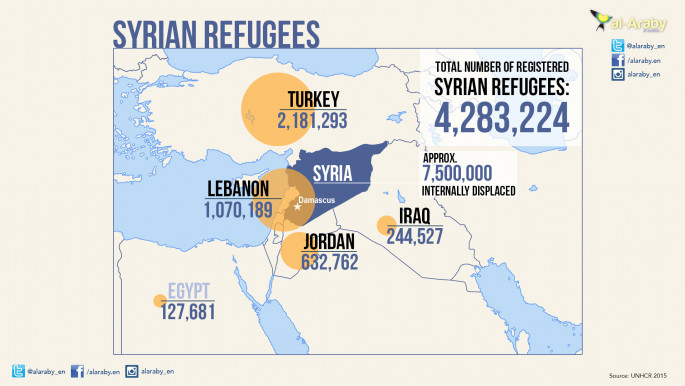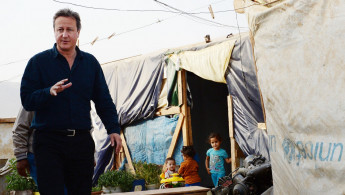Cameron in Middle East: Keep refugees out of Europe
Cameron in Middle East: Keep refugees out of Europe
Analysis: While the British government has pledged to take in 4,000 Syrian refugees a year, it is also encouraging refugees to stay in countries neighbouring Syria.
3 min read
The UK's Conservative government has been reluctant to admit significant numbers of Syrian refugees [Getty]
The unannounced visit by British Prime Minister David Cameron to Lebanon and Jordan on Monday cannot be separated from the fallout of the refugee crisis in Europe.
The crisis has sent European countries scrambling to find a direct and rapid solution.
This includes trying to limit the flow of refugees to European shores in coordination with Syria's neighbours, which host the largest number of Syrian refugees.
The European response seems to have two main components: improving conditions for refugees in the neighbouring host countries, to keep those refugees in place; and cracking down on trafficking of asylum-seekers.
Cameron's visit to Lebanon was brief. In just a few hours, he visited Syrian refugee settlements in east Lebanon and met with a number of officials.
On the same day, Cameron announced he would appoint a dedicated refugees' minister to help resettle 20,000 refugees in the United Kingdom over the next five years, and coordinate aid for Syrian refugees in the Middle East.
Cameron also flew to Jordan on Monday, and met with King Abdullah II.
British media on Tuesday mocked the British prime minister's "tightly choreographed, whistle-stop" visits to refugee camps in the Middle East, with one paper stating at least part of one school classroom visit had been staged "for security reasons and for the message Mr Cameron wanted to project back home".
Cameron was accused of trying to score political points and shifting the narrative away from hosting refugees in Britain, instead emphasising aid for them where they are, closer to Syria.
Another controversy brewing in both Britain and Lebanon today involves the totally unsubstantiated claim by a Lebanese minister, who reportedly told Cameron during his visit that up to two percent of Syrian refugees could be agents of the Islamic State group.
Meanwhile, Lebanese government sources told al-Araby al-Jadeed Arabic that Britain planned to host a number of Syrian refugees from Lebanon in the next five years, at an average of 1,500 refugees per year.
Britain will host similar numbers of Syrian refugees currently in Jordan and Turkey.
Britain is also moving to increase aid to the estimated 1.5 million Syrian refugees in Lebanon. During his meetings in Beirut, David Cameron said his country would double the aid it offered to tackle the Syrian refugee crisis, pledging more than $90 million for the coming three years.
According the UK embassy in Beirut, Britain has allocated $450 million to support stability in Lebanon and $1.5 billion to mitigate the Syrian crisis.
Cameron also met with Lebanese army commander General Jean Kahwaji and reaffirmed the UK's commitment to training and arming the Lebanese armed forces.
The aim of the multimillion dollar British military aid package to Lebanon is to contain spillover from the Syrian conflict and repel extremists across the border.
Britain and other European powers also want Lebanese officials to do more to rein in human traffickers operating between Lebanon and Europe via the Mediterranean. For the past month, the Lebanese security services have been routinely announcing the detention of traffickers operating out of the Lebanese shore.
This is an edited translation from our Arabic edition.
The crisis has sent European countries scrambling to find a direct and rapid solution.
This includes trying to limit the flow of refugees to European shores in coordination with Syria's neighbours, which host the largest number of Syrian refugees.
| Britain is also moving to increase aid to the estimated 1.5 million Syrian refugees in Lebanon |
Cameron's visit to Lebanon was brief. In just a few hours, he visited Syrian refugee settlements in east Lebanon and met with a number of officials.
On the same day, Cameron announced he would appoint a dedicated refugees' minister to help resettle 20,000 refugees in the United Kingdom over the next five years, and coordinate aid for Syrian refugees in the Middle East.
Cameron also flew to Jordan on Monday, and met with King Abdullah II.
British media on Tuesday mocked the British prime minister's "tightly choreographed, whistle-stop" visits to refugee camps in the Middle East, with one paper stating at least part of one school classroom visit had been staged "for security reasons and for the message Mr Cameron wanted to project back home".
Cameron was accused of trying to score political points and shifting the narrative away from hosting refugees in Britain, instead emphasising aid for them where they are, closer to Syria.
Another controversy brewing in both Britain and Lebanon today involves the totally unsubstantiated claim by a Lebanese minister, who reportedly told Cameron during his visit that up to two percent of Syrian refugees could be agents of the Islamic State group.
Meanwhile, Lebanese government sources told al-Araby al-Jadeed Arabic that Britain planned to host a number of Syrian refugees from Lebanon in the next five years, at an average of 1,500 refugees per year.
Britain will host similar numbers of Syrian refugees currently in Jordan and Turkey.
 |
|
| [Click to enlarge] |
According the UK embassy in Beirut, Britain has allocated $450 million to support stability in Lebanon and $1.5 billion to mitigate the Syrian crisis.
Cameron also met with Lebanese army commander General Jean Kahwaji and reaffirmed the UK's commitment to training and arming the Lebanese armed forces.
The aim of the multimillion dollar British military aid package to Lebanon is to contain spillover from the Syrian conflict and repel extremists across the border.
Britain and other European powers also want Lebanese officials to do more to rein in human traffickers operating between Lebanon and Europe via the Mediterranean. For the past month, the Lebanese security services have been routinely announcing the detention of traffickers operating out of the Lebanese shore.
This is an edited translation from our Arabic edition.



